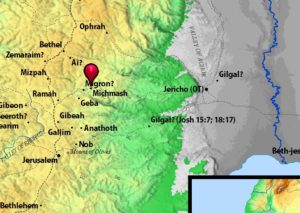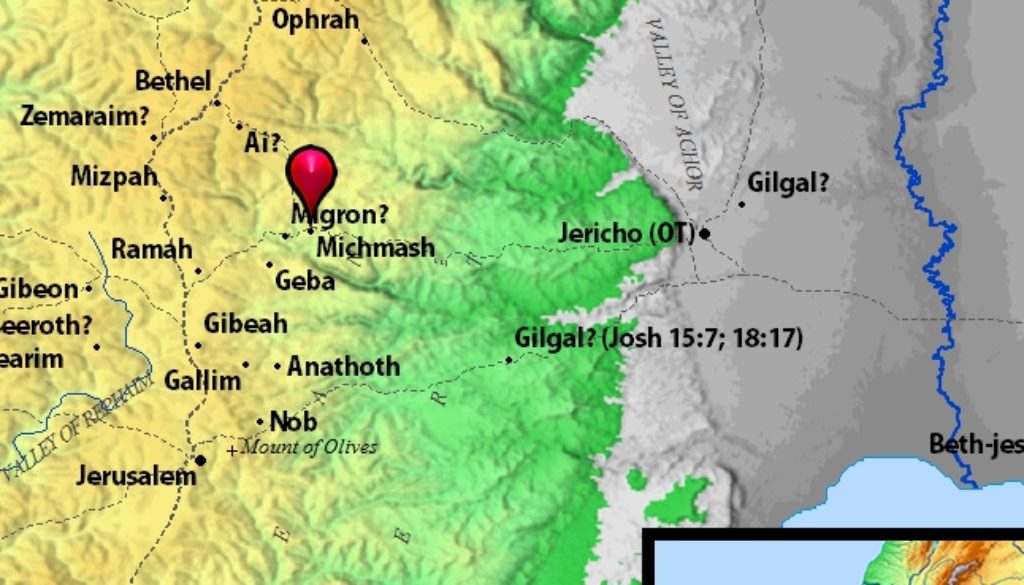1 Samuel 13:1-7 Saul’s Early Years

Saul begins his reign over Israel. The first battle with the Ammonites cemented the people’s loyalty but things slowed down afterwards. Three years pass before another battle is waged.
Today’s reading raises a LOT of questions that I would LOVE to take up with the Lord. Not because I doubt anything put forth in our reading but I want to know the ‘back story’. We are clearly missing a large chunk of the story of Saul’s first years. I’m going to skip writing in story form for the first part of our reading today because I have no idea how to fill in the blanks. I’m going to stick with asking the questions that arise as I move through the early years of Saul’s reign. We will rejoin the story when Saul calls for help at Gilgal.
When Samuel anointed Saul he anointed him as “prince” over Israel. “Has not the Lord anointed you to be prince over His people Israel?” (1 Samuel 10:1b). Since the Lord was Israel’s King, anointing Saul as prince made him ‘next in line for the throne’. God set up a smaller throne for Israel’s new king. God’s throne is over all creation where Saul’s would be limited to Israel.
Saul spent the first year after his confirmation before the people as a prince. He didn’t become king until a full year had passed since his second confirmation. I wonder if the people recognized him as a prince instead of king. Did he not step into the role as king for the first year? Did Samuel insist on this waiting year? Was a ‘waiting year’ written into the book Samuel presented? What was it that raised him from ‘prince’ to king? Was there another ceremony? Or is it possible that there was a year between the time Saul was first brought forth from his hiding place and when he was set before Israel a second time?
Two years after Saul officially took office he raised his first army. Were things quiet between the time Nahash was defeated and this date or were all the men of Israel still on call for whatever battle arose? It feels like it is this second option because after choosing three thousand men Saul sent the rest of them home. And you can’t be ‘sent home’ if you are already there. Also the men had to be assembled in order for his to choose this 3,000 from among them. I wonder what battles they had been fighting during those two years.
Saul’s army was divided into two groups. The largest contingent of 2,000 was with him at Michmash. What was he doing at Michmash? Was he fighting a battle there? The rest of the men Saul chose were at Gibeah with Jonathan. This was Saul’s home town. Was this the beginning of his personal garrison?
The very next thing we hear about is Jonathan’s victory at Geba over the Philistine garrison. Did he win this battle with the 1,000 men he had at Gibeah? How large was the garrison? What made Jonathan decide to go on this campaign? From the response of the Philistines it appears it was a resounding victory for Jonathan. And why did Saul take credit for this victory? Was it because Jonathan did so under Saul’s leadership or rule?
However it happened, it angered the Philistines. Israel was under their thumb and they didn’t like them pushing back, not even if it was only a small group. I have a feeling there had been skirmishes with the Philistines going on during those first two years but the taking of the garrison brought things to a more urgent plane. Let’s join in that confrontation at Gilgal now and see where the story takes us.
♥ ♦ ♥
Small skirmishes between Saul’s new army and the Philistines have been happening for some time. The Lord has been giving Israel victory in each of the encounters. But Saul’s army can’t be everywhere. The people of Israel are afraid. When the Philistines are defeated in one area those in other areas increase their cruelty. Slowly but surely the Philistine’s choke hold on Israel is being loosened but there is still MUCH work to do.
The Philistine lords have gathered to discuss what to do about Israel.
“If we don’t do something decisive SOON we will likely lose the people’s fear of us” calls out the king of Gath.
“How can they possibly think they can defeat us? They have no weaponry” reminds the king of Ekron.
“They seem to be doing a good enough job with what they have on hand right now” roars the king of Ashdod.
“Then we need to put a stop to it NOW! We need to come at them in numbers they cannot hope to defeat” the king of Gath demands.
The five kings agree to a joint venture and battle plans begin to form. “They won’t know what hit them” chuckles the king of Ekron.
A week later the Philistine army marches toward Michmash. Those in neighboring territories saw the troop build-up and sent word to Saul. Saul and his forces were at Michmash at the time. Saul knew he didn’t have enough strength in the 2,000 to meet the enemy numbers so he moves to Gilgal to gather the more forces. On the way there Israelites who had been hiding in every conceivable place came out and followed Saul. These men are swelling Saul’s army numbers but what about their courage? Will it be enough to ensure victory?
The Philistine army arrives at Michmash to discover it is unprotected. There is no sign of Saul or his army. They will wait. Word is sure to travel to him and he will return. Besides, the chariots don’t do well in hilly terrain. It was tough enough getting them to Michmash. Any further and they may prove more of a hindrance than an advantage. No worries, they have enough troops to put Saul down for good!
(to be continued)
♥ ♦ ♥
I have come upon a question while moving through our story. Did Saul really leave Michmash or was the verse concerning him being there part of the narrative as an overview? He didn’t even join Jonathan in Gibeah to join up with the other troops. Michmash was between Gibeah and Gilgal. Did they decide to attack on two sides? What was their battle plan?
Father God, there are so many things I would like to know. I know that most of my questions today will have to wait until I can ask You them face to face. I’m glad I wasn’t living in this time because I HATE warfare! It was both scary and exciting for the people. Scary to be caught up in all the fighting and destruction. Exciting to watch You deliver the people by Your power. I’m looking forward to seeing where Your story and Your Spirit take me. I know this was an important battle in Israel’s history. Thanks for letting me look a little deeper in on it.



